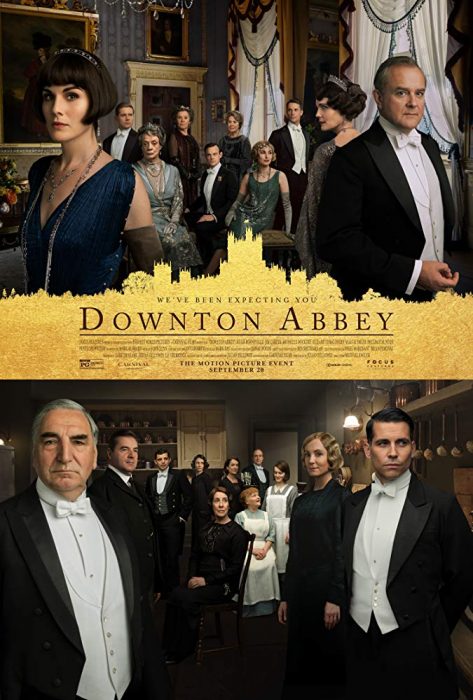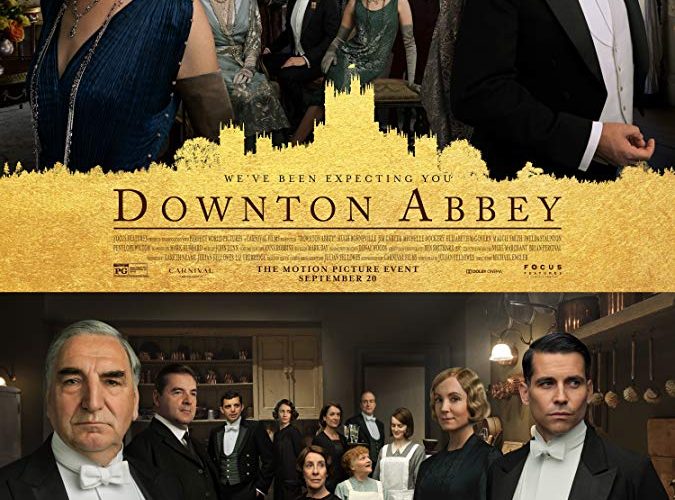
It all comes down to good breeding — and Downton Abbey always had it in spades: stunning costumes, elegant production design and, this being England, centuries-old castles and stately manor houses in which to film the lives of a multigenerational, aristocratic family at the beginning of the 20th Century. American audiences couldn’t get enough of the majesty and mystique of the British upper classes and now, four years after the final episode aired, a feature film picks up, more or less, where the series left off. A couple of years have passed — it is now 1927 – but very little has changed at the Crawley estate. Nearly the entire cast returns — the most notable absence is Lady Rose (Lily James) — and, thank God, none of them has changed an iota. Dame Maggie Smith, the Dowager Countess and matriarch of the Crawley family, still has the best lines and delivers them with the kind of precision and finesse that only… well, that only Maggie Smith can. Over the years, however, Smith has acquired a worthy sparring partner, her cousin Isobel Crawley — now Lady Merton (Dame Penelope Wilton) – whose constant good cheer and egalitarian social outlook both offends and dismays Violet, leading to some of the funniest exchanges on both small screen and large.
The film kicks off with the announcement that King George V and Queen Mary are touring Yorkshire and intend to spend one night at Downton Abbey. The royal visit – and preparations for it – are the movie’s through-line, with a host of subplots branching off from it. Lord and Lady Grantham (Hugh Bonneville and Elizabeth McGovern), feign a certain nonchalance while secretly admitting to one another how thrilled they are. Lady Mary (Michelle Dockery), who has assumed management of the estate, along with her brother-in-law Tom Branson (Alan Leech), is in charge of the domestic arrangements for the royal visit. Her first order of business is to ask Carson to come out of retirement to oversee the staff and keep everything running smoothly.
The servants can barely contain their excitement at the news of the royal visit — but they nearly don’t get to participate. Clever Anna (Joanne Froggatt) concocts a plan that turns the tables on the officious Buckingham Palace staff who try to ride roughshod over our beloved Downton Abbey crew. Perhaps the character who has changed the most below stairs is Daisy (Sophie McShera), the former kitchen maid who now serves as Mrs. Patmore’s (Lesley Nicol) assistant. Once sullen and shy, Daisy has become confident and feisty, qualities she was starting to exhibit in the series’ final seasons. Now fully on display, they make her a far more visible and entertaining presence.
The movie’s premise brings with it a few fresh faces, including Geraldine James as Queen Mary; Simon Jones as King George V; Imelda Staunton as Maud Bagshaw, Queen Mary’s Lady-in-Waiting and a cousin of the Crawley’s who is at odds with Violet; and Tuppence Middleton (an English name if ever there was one) as Maud’s maid/companion, Lucy Smith, who quickly catches Tom Branson’s eye.
Like the long-running TV series, the film was written by Julian Fellowes, who created the original show and all of its characters. American-born Michael Engler, who had directed four episodes over the years, was tapped to direct the film. In many ways, the movie plays like an extended TV episode, with all the pluses and minuses that suggests. The necessity of squeezing everything into two hours inevitably means that some characters, such as Bates (Brendan Coyle), get short-shrift, while a couple of subplots feel rather hurried.
Production values are exquisite, as always. What is it about the British? They bring an unmatched aura of quality to just about everything they make. Once again, Highclere Castle stands in for the Crawley family estate. Manicured lawns and impeccably-tended gardens, along with acres of green fields and woodlands, stretch as far as the eye can see. The camera work is perfection, as roving cameras effortlessly glide from room to room, character to character, wrapping around people and rooms and allowing scenes to play out in long ‘oners’ that seem to last for minutes on end.
Fans of the TV series are the obvious audience for the film. No seismic shifts take place, although it’s nice to see even Thomas (Robert James-Collier), the former footman-turned-butler, find potential happiness. The movie remains extremely faithful to its predecessor. But, really now, why tamper with success?
